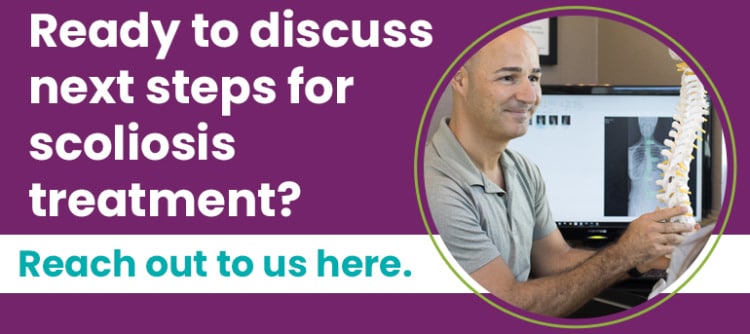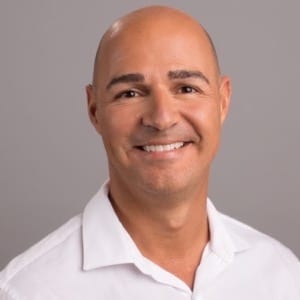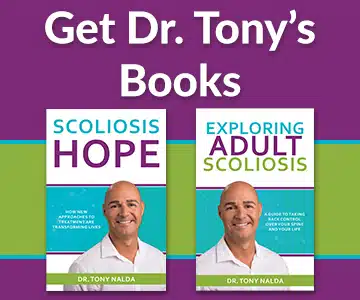If you or someone you love has recently received a scoliosis diagnosis, you are likely wondering about the next step. An important part of being proactive with your health is ensuring that your doctor is experienced in treating the condition you are living with. When it comes to finding a doctor to treat scoliosis, I highly recommend finding a specialist who is certified in multiple modalities.
Treating Someone’s Scoliosis vs. Treating Someone with Scoliosis
Before we get into the different training and certifications that doctors wanting to specialize in scoliosis can get, I first want to clarify the difference between treating someone’s scoliosis and treating someone with scoliosis.
While this distinction might not seem overly important, I can assure you it is. While a general practitioner can most definitely treat someone with scoliosis, unless they are specifically trained in scoliosis, they will be treating the condition’s symptoms, rather than the condition itself.
Treatment from a general practitioner for a patient with scoliosis could include pain-management options, monitoring progression with X-rays, and even customizing a scoliosis-specific exercise regime aimed at strengthening the back and improving overall function. This choice could likely result in the recommendation for spinal-fusion surgery, if/when progression reaches a certain stage.
When I say ‘treating someone’s scoliosis’, I don’t just mean treating that patient’s symptoms, I mean treating the underlying causes of the condition and achieving a curvature reduction or reversal, and this can be different based on the type of scoliosis.
A specialist who’s certified and trained in scoliosis-specific treatment options not only has a more comprehensive understanding of the condition, they are better equipped to read a scoliosis X-ray and will have experience in how to stay ahead of a spinal curvature.
Spinal-Fusion Surgery as Treatment
Obviously, there are surgeons who specialize in performing spinal-fusion surgery, and this is the traditional approach to treating patients with scoliosis once their condition has progressed to a certain point. However, I caution patients against this path as there are less invasive, dangerous, and costly treatment options available.
Using rods, screws, and wires to hold the spine in place while the vertebrae fuse is still only treating the main symptom of the condition – the curvature – and not the condition itself.
While spinal-fusion surgery can be successful in one aspect of straightening a crooked spine, there are many risks involved. The quality of life and mobility impairments that many patients are left with, not to mention the possibility of needing subsequent surgeries, is not the treatment path I would recommend.
Let’s also touch on the emotional and psychological effects of knowing you are living with a rod and hardware in your back. Many patients find this to be an unexpected challenge as they struggle with the fear of breaking a rod or a screw coming loose, especially when trying new activities they are unsure of.
When comparing people who have had spinal-fusion surgery with people who are undergoing my chiropractic-centered approach, my patients have far less restrictions and mobility issues than those who’ve come to me after having surgery; that’s the big difference between a treatment option that treats the symptom, versus one that treats the condition.
The Chiropractic Approach to Scoliosis
When I became a chiropractor, it was with the goal of helping people. While I could successfully treat my regular patients, I was disappointed that I couldn’t do more for my scoliosis patients. This got me interested in alternative treatment approaches and caused me to seek training outside of regular chiropractic and focus on scoliosis-specific chiropractic care; this is where I’ve made my mark, and this is where I most recommend people start when looking for a doctor to treat scoliosis.
I discovered that chiropractic is most effective for treating scoliosis when it’s used in conjunction with other therapies. This is why I always encourage people to seek out a specialist with training and certification in different modalities.
The underlying goal of the chiropractic approach to treating scoliosis is to reduce risk by monitoring and staying ahead of the condition’s progression and improving function. In this respect, we are actually responding to the condition’s natural tendency to worsen and trying to counteract that tendency, rather than merely treating its symptoms.
Details of a Scoliosis-Specific ChiropracticTreatment Plan
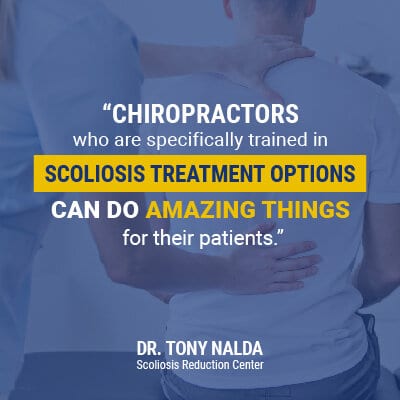
Chiropractors who are specifically trained in scoliosis treatment options can do amazing things for their patients. While there is no ‘curing’ scoliosis, a scoliosis-specific chiropractor can do a lot more than just manage the condition.
This approach responds to the progressive nature of the condition itself and can slow, halt, or even reverse it. As cases of scoliosis differ greatly from patient to patient, each treatment plan should be 100-percent customized.
The most successful chiropractic treatment plans for scoliosis combine adjustments, rehabilitation, scoliosis-specific exercise and stretches, corrective bracing, and active and passive rehabilitation practices.
The level of intensity and the balance of these approaches would be determined by the patient’s needs, abilities, and condition severity.
- I’ve found that, with this approach, treatment is most successful when patients engage in an intense burst of treatment in a short amount of time. Treatment results are sustainable by supplementing the treatment program near you with at-home practices as well.
- With full commitment from my patients, I often see results within two weeks. Once a curvature reduction is achieved, the focus is on maintaining those results and adjusting the treatment approach when/if the condition starts to progress again.
Certifications for Doctors Treating Scoliosis
- As mentioned earlier, there is a big difference between treating someone with scoliosis and treating someone’s scoliosis.
- Any practicing MD can treat someone with scoliosis, but if you’re looking for a doctor to treat the condition itself, a scoliosis specialist trained in various modalities is by far the best choice.
- When considering different doctors, keep in mind that even a specialist might only have experience with one form of treatment. Patients with scoliosis benefit from being treated by a specialist capable of combining therapies for the best treatment results. These specialists aren’t just able to treat the patient but are trained and experienced in managing the condition’s progression: the best way to avoid a spinal-fusion surgery recommendation.
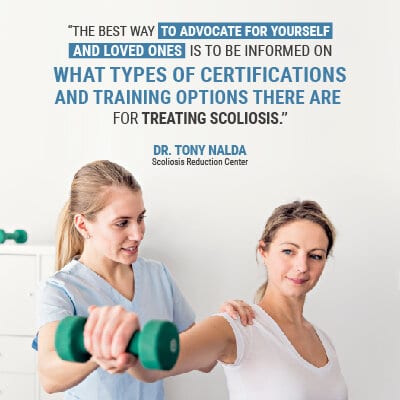
Don’t be afraid to confirm just how qualified a doctor you are considering is.
- The best way to advocate for yourself and loved ones is to be informed on what types of certifications and training options there are for treating scoliosis.
There are numerous different scoliosis certifications an MD can receive.
Following are some of the most highly regarded and successful certification options to look for in a doctor treating scoliosis:
- CLEAR: Chiropractic Leadership, Educational Advancement, and Research that focuses on advanced methods of rehabilitation, diagnosis, and treatment for scoliosis
- ISICO: Italian Scientific Spine Institute applies innovation to the rehabilitative treatment of non-surgical spinal diseases (Masters certification)
- SOSORT: the Society on Scoliosis Orthopedic and Rehabilitation Treatment focuses on the advancement of non-operative management of idiopathic scoliosis
- SEAS: the Scientific Exercises Approach to Scoliosis is an innovative and evidence-based approach to managing scoliosis through physiotherapy scoliosis-specific exercises.
- ScoliBrace certification in corrective 3D bracing
- Pettibon system certification focuses on assessment and rehabilitation practices that aim to rehabilitate the spine and correct posture.
- GOSS: the Gomez Orthotic Spine System is a conservative spinal-deformity treatment plan that focuses on the importance of spinal stability and balance.
- Diagnostic training and certification in MRIs, X-rays, etc
Finding a doctor with multiple certifications can have a lot of benefits in terms of treatment efficacy. The more certifications a doctor has in different modalities, the more capable they are in drawing from each of those modalities to customize the best possible treatment plan for each of their patients.
If you’re wondering who the best doctor for scoliosis is, consider seeking treatment from the Scoliosis Reduction Center® with Dr. Tony Nalda, an Orlando-based facility known for its expertise in scoliosis care, addressing various degrees of scoliosis and providing comprehensive treatment options.
In addition, the Scoliosis Reduction Center® has facilities in Augusta, GA, Tampa, FL and Athens, GA, among others to make it easier to find proper treatment near you.
Conclusion
Now that we’ve discussed the different types of scoliosis-specific certifications a doctor can get, you’re likely wondering what types of qualifications I have. In addition to being a licensed and practicing chiropractor, I’m CLEAR, ISICO, GOSS, Pettibon, and ScoliBrace certified. I’m also certified in Digital Motion X-ray (DMX) which allows me to see the spine in motion.
I attribute a large part of my successful practice here at the Scoliosis Reduction Center® to my training in these distinct modalities. I feel that pursuing knowledge and experience with different approaches, strategies, and treatment options for scoliosis has led me to a comprehensive understanding of the condition and how best to help my patients living with the challenges of scoliosis.
People with scoliosis will be living with the condition for their entire lives, but this doesn’t have to be seen as some kind of sentence. Although there are still many questions surrounding the condition with answers still evading us, there is no shortage of effective treatment options that can make living with the condition as positive an experience as possible.
When it comes to choosing a doctor for treating your scoliosis, this is an important decision that can affect your experience with the condition in multiple ways. I suggest finding a doctor that specializes in the condition and is certified in multiple treatment approaches.
This ensures they have a comprehensive understanding of the condition, is up to date on diagnostic and treatment advancements, and has a vast wealth of knowledge to draw from when customizing treatment plans for their patients. I also recommend looking outside of the traditional treatment path and approach as this often involves passively observing the condition while it progresses, until the patient is told surgery is the best option.
When it comes to finding a doctor that treats scoliosis for yourself or a loved one, the best advice I can give is to seek out a scoliosis specialist. Most people do this in other areas of life without really thinking about it. Think of it this way, if you’re having car troubles with your Dodge, you wouldn’t consider going to a Ford dealership for answers or maintenance; it should be the same with your health.
If you have scoliosis, don’t go to a general practitioner who doesn’t have scoliosis-specific training and experience. Go to someone who is specifically trained in the condition that you are needing treatment for as this greatly increases the chances of treatment efficacy.



